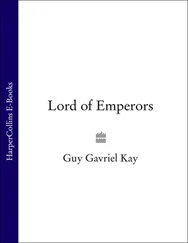The last of them held out a considerable time, but eventually were overrun by barbarians—the emerging Xiaolu people.
The mountain sanctuary was plundered and burned.
The Kanlins on Stone Drum—about eighty of them, it was believed, at the very end—had elected to be slain there, to die fighting, rather than retreat south and surrender their sacred mountain to the steppe.
It was a complex incident in history and those who shaped and recorded the official doctrines in this Twelfth Dynasty had difficulty with it.
The black-clad Kanlins had been mystics with esoteric beliefs, and notoriously independent. They allowed women to train and fight and live freely among them. Many of their practices (not only concerning women) diverged from acceptable behaviour. They were also a military group as much as a religious one, and everyone knew what had happened in the Ninth because of military leaders. The Kanlin Warriors might have been permitted their secluded, untaxed sanctuaries back then, but this was a different era, a different world.
On the other hand, they had been honourable, loyal, and unquestionably brave, and the last ones on the summit of Stone Drum, men and women both, had died for Kitai in one of the lost and longed-for Fourteen Prefectures.
That had to be allowed to mean something.
It had been decided that no one would be punished or criticized for making reference to that last stand on Stone Drum Mountain—for writing a song or a poem or a street theatre performance about it. But the last defence of the mountain would not become an officially sanctioned mourning ritual of any kind. It was seen as preferable that the Kanlins slip quietly from history into folk tale, peasant belief, akin to fox-women or those spirit worlds said to be hidden under oak-tree roots in forests.
Good governance, in any time, required delicate decisions of just this sort.
SHE IS FINALLY ALONE. All the men have left: the one who’d come to kill her, the guards, the soldiers, the senior official from the Ministry of Rites (a bleak, cold man). The house is hers again. She tries to decide if it is the same house.
She is waiting for tea to be brought to her. No one is asleep. She is downstairs, in the small reception room—made smaller by bronzes they’ve collected.
Servants are cleaning her bedchamber, discarding the knife-shredded silks and pillow. They will light incense in burners, to take away the odour of so many men in a lady’s room, and the presence of so much violence.
Some of that violence had been hers. She is still not entirely certain why she’d been so insistent about that. It has to do with her father’s exile, she tells herself, and that is surely true, but it might not be all the truth. She’d used her husband’s second-favourite stick. It is heavy.
His favourite stick is with him now. He is away. She sits by a fire trying to decide if she is going to be able to forgive him for not being here tonight. Yes, he’d planned this journey some time ago. They had both been preparing to go west, towards Xinan and the hills above it, the burial mounds of long-ago emperors.
Then she’d received word about her father—his shocking, unspeakable exile to Lingzhou—and of course she wasn’t going anywhere at all.
Wai should not have gone either. It is hard for her to shake that thought. A husband, a son-in-law, he ought to have stayed to use whatever influence he had to help.
Problem was, he had no influence, and the hard truth was that if his father-in-law was named a treacherous member of an abhorred faction it was bad news for Qi Wai, and the smartest thing for him was to be as detached as possible from Lin Kuo’s banishment.
It had made sense for Wai to leave Hanjin.
That didn’t mean she had to forgive him for it.
She’d used his stick to strike the assassin as he strode to her bed and stabbed downwards (she might have been there, she might easily have been sleeping there). She’d been instructed not to hit him with all her strength, that he was to remain alive.
She’d hit him with all her strength.
He did remain alive. She’d thought he would, although she hadn’t greatly cared in the moment. That, by itself, is disturbing. That she can kill or not kill, with indifference as to which it might be.
The tea finally comes. Her principal maidservant is agitated, trembling. The servants have not had time to deal with this. Neither has she. She is still trying to understand, and accept, the feelings of rage that rose within her tonight, looking down at the man on the floor of her bedroom, his hands bound behind his back.
It really is about her father, she decides. The assassin wasn’t the one who’d ordered Lin Kuo exiled (of course he wasn’t!) but he was a part of that evil, and the only part she could see, reach, strike—break bones in his feet. She had felt them break.
She’d asked if he could be castrated. She’d wanted that.
It is frightening, how much anger can be inside a person.
He’d be dead by night’s end, the bleak man from the Ministry of Rites had told her. And the Lady Yu-lan was to be arrested in the morning. They were satisfied, he’d said before leaving, that this one had been the instrument of the lady, not her husband. The exile of her father was Kai Zhen’s doing, but not this.
She watches her servant pour the tea, without the ease she usually displays, willowy as she bends. Her husband likes this servant for her grace. Qi Wai likes that in women, his wife knows. She is not especially graceful herself, not trained that way, nor soothing and assuaging in her manner. He values her intelligence (she knows it), he likes having her with him on expeditions to hunt down scrolls, bronze tripods, weapons, wine cups, artifacts of distant dynasties, but she does not ease his spirit.
She doesn’t ease her own. That is not what she is. She has not yet decided what she is. She is someone who can speak of castrating an attacker, break bones in his feet.
He had come to kill her. And rape her. They had intended to send her father to Lingzhou Isle to die. The assassin’s screaming hadn’t distressed her. It might do so later, Shan thinks. She dismisses the servant, picks up her tea. She might hear those screams in her mind. She is afraid she will.
Her father will not be exiled now. She has a letter confirming that. It is on the desk across the room. The letter had warned that Lady Yu-lan might send someone with malevolent purpose to their house tonight. Guards would be provided. It had also informed her that the celestial emperor, in his supreme compassion, had himself rescinded the order of exile for Court Gentleman Lin Kuo. He was to be raised in rank, instead.
The serene and exalted emperor also wished to have conveyed his personal commendation to Lady Lin Shan for her well-formed brush strokes. She was commanded to attend upon him in the Genyue the following afternoon.
They are to discuss calligraphy and other matters.
Imperial guards would call for her, the letter advised. It was suggested by the writer that she might wish to bring some of her own songs, in her own hand, as gifts for the emperor.
The letter was signed by Hang Dejin, prime minister of Kitai.
The emperor wishes to see her. In his garden. She is to bring her songs. It is beyond belief. If she doesn’t understand her own nature, Lin Shan thinks, how can she possibly hope to understand the world?
She begins to cry. She dislikes that, but there is no one else in the room now, and so she permits herself this. It is the middle of the night. The moon is west. She drinks hot, scented tea from Szechen in an autumn room lit by three lamps, crowded with ancient bronze, and she watches her tears fall into the cup.
There might be a song in that, she thinks. She wonders where her husband is tonight, if he has reached Xinan.
Читать дальше












